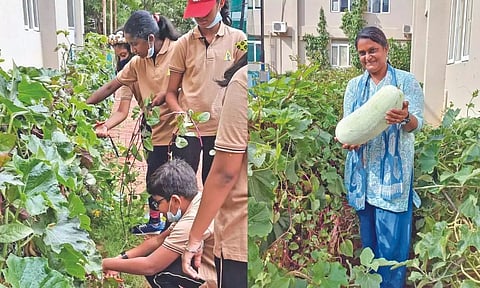

CHENNAI: In 2017, Maya Ganesh introduced the concept of a regenerative agriculture school garden in Chennai. Her students were curious, asking questions like, “Does radish grow on trees and tomato grow underground?” Fast forward to today, what was once just a cluster of buildings has transformed into a vibrant school. Every corner of the campus is now filled with creepers, short crops, tall plants, fruits, and vegetables.
Maya, whose grandparents loved gardening, initially dreamt of working in the environment field. However, she felt compelled to choose a more conventional path due to family expectations. She discovered the 1987 report by the United Nations’ Brundtland Commission, which sounded the alarm about climate change. The report highlighted three key areas: environmental, social, and economic development. Maya noticed that society focuses only on economic aspects.
“In Chennai, many buildings are constructed on water bodies, paving the way to floods during the rainy season. There is development but it is not sustainable,” starts Maya, who wishes to work for the betterment of the world. She did her Master’s at the University College of London, pursuing environmental and sustainable development. She was greatly influenced by her professor Robert Biel’s farm garden on his allotted land. An allotment scheme is an idea followed in London, where the government provides a piece of land within the city limits to grow their farm.
Maya’s experience is filled with experimentation and learning. “A restaurant approached me to do waste management. I followed the Bokashi method of composting, where the bokashi powder is used to break down the waste. The liquid can be used for plants as it is fermented,” says the regenerative agriculture consultant.
She ventured into the world of school gardens after taking inspiration from the Govardhan Eco Village, which trained the villagers in following organic farming methods and also helped them sell the produce. They are the recipient of the UN World Tourism Organisation award in 2017. “That is when the idea of school gardens bloomed in me. They have the capacity to change the world and it is crucial for every school to have one. Through this, students can be educated with various other subjects like water, soil management, composting and how this can be a tool in mitigating climate change,” she shares. Maya got in touch with the founder of APL Global School Geeta Jaganathan and proposed to set up a school garden at their new campus in Thoraipakkam.
“We use open-pollinated hardy variety seeds and grow diverse plants of native varieties on a patch. These can withstand natural calamities to some extent. There are three students-made forests in the school,” reflects the 49-year-old.
Explaining to DT Next the origin of chemical farming in India, she elucidates, “Chemical-based monoculture farming was introduced in India after the great Bengal famine and other calamities, in the 1960s, to grow crops quickly with chemical fertilisers, called the Green Revolution. It is for an instant relief and not meant for the long run, which has now resulted in suffering.”
In the school, they have a bed of all kinds of root vegetables and also 11 distinct varieties of brinjal. They grow more perennials and fewer annuals to create a permanent ecosystem that is climate change resilient and can withstand shocks in the ecosystem, thus mimicking natural forests. They use herbal plants to keep away the pests. “This garden also teaches children about moderation. For example, in prey-predator relationships, the predator never completely wipes out a particular population and only preys on what is required, allowing the prey population to breed and reproduce. On the other hand, humans tend to overuse a particular natural resource that causes extinction of a particular species,” adds the biophile.
Students from Kindergarten to class 12 are a part of this. “It was a priceless moment to see the happiness on the faces of the students when a plant bears a fruit or vegetable,” she says with a hearty smile. Along with Maya Ganesh, Shalini is also teaching children about this organic farming method. They also have a seed bank of their own. The idea of regenerative agriculture is that one plant takes care of another. Maya emphasises that children learn the importance of collaboration over competition by observing such collaboration in nature.